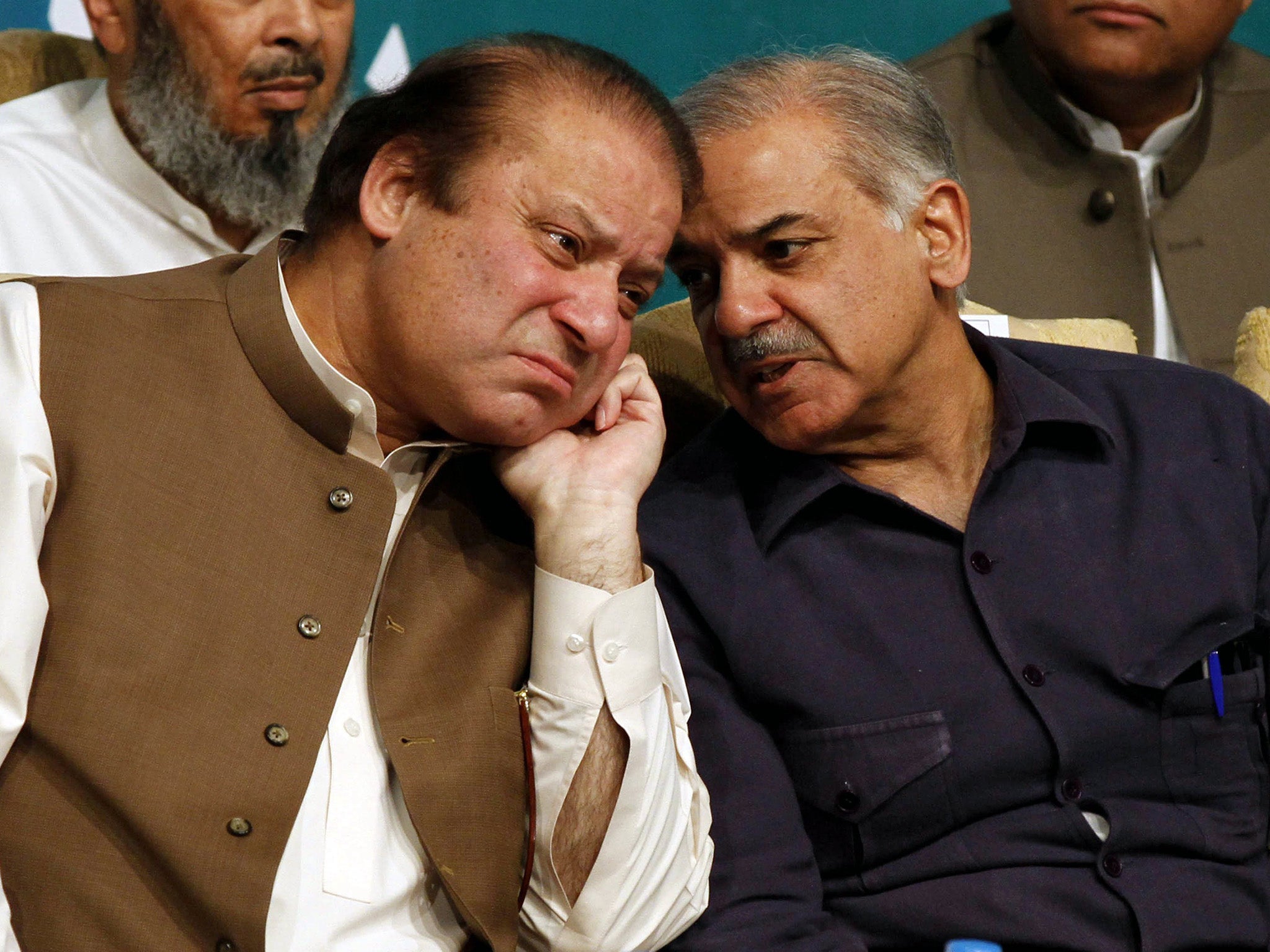The Independent's journalism is supported by our readers. When you purchase through links on our site, we may earn commission.
The Sharif family isn't going anywhere. And that’s not exactly great news for Pakistan
Shahid Khaqan Abassi, who has been sworn in as Prime Minister, has indicated that he is no ‘bench warmer’. But Nawaz Sharif's brother will eventually take over


On Tuesday, former Petroleum Minister Shahid Khaqan Abbasi was sworn in as the Prime Minister of Pakistan, replacing Nawaz Sharif who has been disqualified by the Supreme Court over “dishonesty” following a probe into the Panama Papers leaks.
While Abbasi’s comfortable win following the National Assembly vote was expected, the ruling Pakistan Muslim League-Nawaz (PML-N) is interpreting it as a resounding triumph that reaffirms the party’s parliamentary clout.
However, despite Abbasi’s claims that he’s no “bench warmer”, the party’s plan is to eventually allow Shahbaz Sharif to take over as the Prime Minister, after contesting a by-election on the seat vacated by his elder brother Nawaz.
This would mean the younger Sharif giving up his current position as the Chief Minister of Punjab, Pakistan’s most populous province, which could be taken up by his son (and Nawaz’s nephew), Hamza Shahbaz Sharif.
This shakeup in the centre and Punjab, expected to materialise by the end of September, would reaffirm the Sharif family’s control over the federal and Punjab governments – and indeed the ruling party named after them.
It also inadvertently sends out a clear message to the party MNA (National Assembly members) and MPAs (Provincial Assembly members): none of them merit even a nine-month stint as the Prime Minister, or Chief Minister, ahead of next year’s elections.
While it underscores dynastic politics’ throttlehold over Pakistan, the reshuffle also accentuates the PML-N’s desperation, as the ruling party faces challenges as diverse as judicial probes, military intrusion, an opposition gaining momentum, and disgruntled senior party members threatening defection.
In this regard, maintaining the Sharif brand for the ruling party is as much a “nepotistic disgrace” – as an editorial in Pakistan’s leading English newspaper Dawn dubbed it – as it’s the PML-N’s version of the “doctrine of necessity” aimed at preventing party disintegration on the brink of the general elections.
At a time when the opposition Pakistan People’s Party (PPP) still has to maintain brand “Bhutto”, four decades after the party founder Zulfikar Ali Bhutto’s judicial execution, just so it can cling on to its depreciating vote bank, one can imagine the impact having a non-Sharif at the helm could have on the PML-N next year.
This vicious circle of dynastic politics, and the popular trend to vote for names and not ideas, is also true for the Pakistan Tehrik-e-Insaf (PTI) whose chairman Imran Khan – the chief orchestrator of the probe that eventually ousted Nawaz Sharif – is a demagogue who has successfully wooed a heretofore untapped vote bank towards “brand Khan” which is synonymous with “change”.
Khan’s rhetoric, which conspicuously steers clear of holding the country’s all-powerful Army leadership accountable for their many misadventures, bears an uncanny resemblance to the surge of alt-right parties in the West in its fixation with antagonism towards a misrepresentated status quo.
With farcical intraparty elections underscoring the undemocratic nature of the leading political parties in Pakistan, it is ironically the Islamist Jamaat-e-Islami (JI) – with its long-stated ambition of formalising Sharia law – that is the sole prominent ideological party devoid of individual or familial influence.
Many argue that dynastic politics, which has particularly marred South Asia, isn’t as high on the priority list of issues facing Pakistan, especially considering that the Army’s interventionism has never allowed democracy to flourish in the country to a point where informed voters could truly understand the significance of the electoral process.
That all civilian governments are incompetent in handling the challenges facing Pakistan, and in turn fertile grounds for corruption and nepotism, is a self-fulfilling prophecy that has been paving way for the Army’s stranglehold over the country over the past seven decades.
This is the argument that one would expect to echo from the PML-N over the next 10 months, as it relies on the victim card against the conspiracy of “external factors”, to continue to self-identify as democracy itself.
And the nomination of Shahbaz Sharif, whose blatant confrontation with the intelligence chief last year instigated a civil-military crisis that sent two senior PML-N leaders packing, would reaffirm the party’s alignment in opposition to the military establishment.
The ruling family are sending clear message across to their voters, the opposition parties and indeed the senior Army leadership: that the Sharifs aren’t going anywhere. But this stubbornness to cling on to the party name is as damaging to democracy in the country as the “soft coup” currently in play.
Whether or not that’s equally detrimental to Pakistan’s larger interests depends on what the Sharifs do with the “continuity” they’re seeking.
Either way, this “doctrine of necessity” being used to squash actual democracy, counterfeits the arguments that Army leaders have historically presented to overthrow elected leaders in Pakistan.
Join our commenting forum
Join thought-provoking conversations, follow other Independent readers and see their replies
Comments
Bookmark popover
Removed from bookmarks